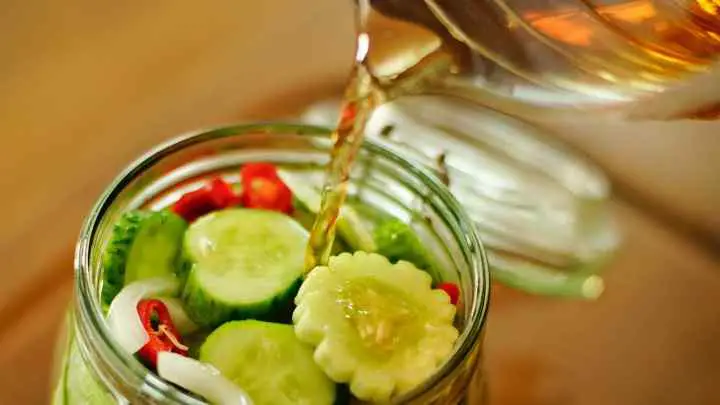Can you use rice vinegar instead of white vinegar or not? The answer is yes, you can!
Rice vinegar is a great substitute for white vinegar because it has a similar acidity level and loads of health benefits. You can use it to pickle vegetables, make salad dressings, deglaze a pan, etc., depending on your immediate needs.
Additionally, rice vinegar has a slightly sweeter taste than white vinegar, so you may want to adjust the amount of sugar in your recipe accordingly.
To learn more about vinegar, please read on.
What Is Rice Vinegar?
Rice vinegar is made from rice that has been fermented. It is used in various Asian cuisines as a condiment or pickling agent, particularly in Chinese and Japanese cuisine.
It has a milder flavor than other kinds of vinegar and is often used to give food a light and refreshing taste.
Types And Usage Of Rice Vinegar
Rice vinegar is a colorless liquid that has a high amount of vinegar. It is mostly used for making delicious dipping sauces, sushi, and salad dressing. It is also used as a pickling agent or added to marinade sauces.
There are two main types of rice vinegar: white rice vinegar and red rice vinegar. White rice vinegar is made from fermented white rice and has a milder, sweeter flavor. Conversely, red rice vinegar is made from fermented red rice and has a slightly sour and earthy flavor.
What Is White Vinegar?
White vinegar is a type of vinegar that is made by combining acetic acid and water. Its acetic acid is produced by fermenting ethanol or sugar. It has a variety of uses, including cleaning, cooking, and preserving food. It can also be used as a natural disinfectant or deodorizer.
Finally, white vinegar is typically made with a 5% acetic acid concentration but can also be made with a higher concentration for cleaning purposes.
SEE: If Rice Vinegar Goes Bad or Lasts Forever
Can You Substitute Rice Vinegar For White Vinegar?
Yes, you can. In most cooking applications, it’s safe to substitute rice vinegar for white vinegar. Just keep in mind that rice vinegar has a more mellowed acidity and tastes sweeter than its counterpart.
Furthermore, apple cider vinegar or malt vinegar are great substitutes for white vinegar. Meanwhile, champagne vinegar, lemon juice, white wine vinegar, etc. are other substitutes for rice vinegar.
Does Rice Vinegar Taste Like White Vinegar?
No, it doesn’t. Rice vinegar has a totally different flavor from white vinegar. You’ll get a sweet and delicate taste from rice vinegar. Conversely, you can expect a sour and harsh taste from white vinegar. Because of its aggressiveness, white vinegar is fondly used as a home cleaner.
Overall, the only major similarity between the two is that they have almost similar colors.
What Else Can You Use If You Don’t Have White Vinegar?
If you’re trying to whip up a recipe that requires vinegar but you do not have any stored up, here are the seven best substitutes that can save the day.
- Lime juice
- Red wine vinegar
- White wine
- Lemon juice
- White balsamic vinegar
- Malt vinegar
Which Vinegar Is Best Used For Cooking?
Various kinds of vinegar can be used while cooking, and they all have unique flavors that can enhance the taste of your dishes. However, the most popular are white vinegar, apple cider, and red wine vinegar.
White vinegar is the most versatile and can be used in various dishes like chicken and pickling brine. Apple cider vinegar has a slightly sweet taste that can add a unique flavor to your dishes.
Red wine vinegar has a bolder flavor, especially when you add it to vegetables and beef, and is perfect for adding a zesty kick to your recipes.
Consequently, when choosing vinegar for cooking, it is important to consider the flavor of the dish you are preparing.
SEE: Pollo Campero And Get A Free Meal
Which Vinegar Is Best For Chinese Cooking?
Rice vinegar. It’s commonly used in Asian cuisine to make stir-fry dishes, noodles, vegetables, etc.
Health Benefits Of Vinegar That You May Not Know
Vinegar is great for cooking, and it also has some amazing health benefits. Here are five ways that vinegar can improve your health:
- It can boost your immune system: The acetic acid in vinegar can help kill harmful bacteria and viruses, making it a great way to boost your immune system.
- Can improve your digestion: Vinegar’s acidity helps break down food, making it easier for your body to absorb the nutrients it needs.
- Vinegar can help you lose weight: Vinegar can help to increase your feeling of fullness, leading you to eat less and ultimately lose weight.
- It can improve your skin health: Vinegar’s antiseptic properties can help to clear up acne and other skin conditions.
- Vinegar can lower your risk of heart disease: The acetic acid in vinegar can help lower your cholesterol and triglyceride levels, both of which are risk factors for heart disease.
How To Make White Vinegar At Home
White vinegar is a household staple with various uses, from cleaning to cooking. Thankfully, you can purchase white vinegar at the store or make your own at home.
Here’s how:
- Start with a base of distilled water: Distilled water is key in making vinegar because it contains no minerals that could interfere with the vinegar-making process.
- Add sugar to the water: The sugar will serve as food for the bacteria, turning the mixture into vinegar.
- Add a mother: A “mother” is a colony of bacteria that helps speed up vinegar-making. You can purchase a mother online or from a homebrew supply store.
- Place the mixture in a warm, dark place: The warmer the temperature, the faster the vinegar will form. But be careful not to let it get too hot, or else it could ruin the vinegar.
- Check on the mixture every few days: After about two weeks, you should start to see signs of vinegar forming, like bubbles on the surface of the mixture.
- When the vinegar is ready, strain it and store it in a glass jar.
Overall, making your own white vinegar at home is easy and economical, and you’ll end up with a product that’s just as good as anything you could buy at the store.
So, go ahead and give it a try.
FAQs
Can you make sushi using white vinegar instead of rice vinegar?
Yes, you can. White vinegar helps to prevent bacteria from growing on your sushi. Its unique and intense flavor makes every dish count.
Can you use rice vinegar for cooking?
Yes, you can. But remember that it has a sweeter taste than white vinegar.
Is rice vinegar good for your health?
Yes, it is. This study shows that taking 750g of acetic acid (about 15 ml of vinegar) can minimize health issues like systolic blood pressure in adults.
Conclusion
Rice vinegar is a great substitute for white vinegar in many recipes. Although it is more commonly used for cooking, white distilled vinegar works best for cleaning because it is made without a coloring agent.
Thank you for reading.
Also, don’t forget to visit Cheffist for other similar content.







